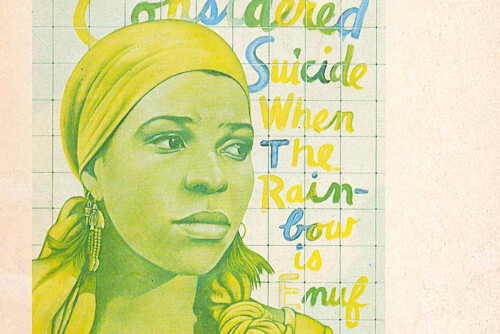A response to the panel “The Multiple Futures of Gender and Sexuality Studies” at the conference Activism and the Academy: Celebrating 40 Years of Feminist Scholarship and Action. Watch the video here:
“So, when are you going to stop talking about institutionalization?” a colleague recently asked, in a tone that was both jocular and disdainful at once. “When people stop asking me to,” I retorted defensively, trying as hard as I could to finish our lunch without it slipping into our last lunch. To my ears, the question was a flippant dismissal of issues I have taken to be of genuine scholarly value rather than fodder for the suggestion that talking about institutionalization was like droning on about your ex. Yet, I knew instantly that the question felt sharp because it cut into something true: Academic talk about institutionalization is a genre of its own, and very little of it is new. For my part, I have typically sided against the denunciation of institutionalization, wondering not only how the university became such an exceptional scene of collective regret, but why the performance of that regret had so much cachet in advancing one’s career. Instead I have defended institutionalization both as a political project and a critical object of study, not because I love to embrace complicity, but because the alternative claim—of being in the university but not of it—has always seemed too self-serving, especially when you have tenure. As I see it, there is no way to critique the university without tacitly affirming it, which is why it has always been important to specify precisely what we hope to salvage or defend. In the current political climate, where everyone is denouncing the university as a bloated or defunct institution, this specificity is more important than ever.
Still, it is a curious thing how much academic attention has been paid to issues of field formation and the politics of the university in feminist studies—not only by me, but also by many other scholars across the nearly five decades of the field’s presence in the US academy. In the title of the 2011 Barnard Center for Research on Women panel discussion, the “Multiple Futures of Gender and Sexuality Studies,” we get a glimpse at what remains so potent about these conversations, as the specter of the future (now multiplied) collates the promise that the present withholds. This promise—so alive in the presentations by Candice Chuh, Ann Pellegrini, and Sarita See—is about a radical remaking of the institution, one that would position the study of race, gender, sexuality, and post/colonialism “as central rather than marginal to the academic mission,” as Lisa Duggan phrased it in her introductory remarks. By invoking the promise of academic centrality, Duggan asked panelists to speculate on the structure of the institution they would build if the agency to make such decisions belonged to them: “If you suddenly had the power to remake the university in any way that you wanted, how would you institutionalize gender, women’s, LGBT, postcolonial, and ethnic studies?” One doesn’t need the audience’s laughter to know that this is an unworldly question, one wildly out of sync with the realities of the contemporary situation, which Duggan perfectly indexes in her summary of corporate education and its vision of faculty as contingent labor, students as consumers, and learning as outcome-oriented—a present that is no longer simply “the university in ruins,” as Bill Readings labeled it in 1996, but an institution whose entire ecology is being remade by the harsh neoliberal rationalities of “crisis” management.
In this context, which to many observers is the most thoroughgoing revision of the academy in more than a century, the promise of a counter-radicality offers enormous relief, allowing panelists to turn their attention away from the overwhelming struggles of everyday institutional life to the political aspirations that have sustained and continue to sustain scholarly investments in our fields. For Chuh, this means imagining forms of institutionalization that refuse to settle into “institutionality,” a term she uses, via Roderick Ferguson, to connote practices of inclusion that domesticate the epistemological force of minority discourses by marketing difference as multiculturalism. For Pellegrini, it means promoting—both in the classroom and in the conference room—a system of values different from that of neoliberalism by avowing support for the anti-instrumental itineraries of critical thought where creativity and alternative forms of collective world-building can live. And for See, it means creating “a non-propertied space of knowledge production,” one that can nurture collaborative projects on race and colonialism while simultaneously honing the anti-imperial “lessons of un-owning knowledge.” In quite distinctive ways, the panelists engaged Duggan’s organizing provocation by centering the critical horizons and analytic priorities of the fields in question while working hard to sidestep what are taken to be the various threats posed by institutional incorporation. For frequent travelers in the world of conversations about the university, the distinctions that emerge—between appropriation and radicality, domestication and epistemological insurgency, and normalizing and perverse pedagogies—are as familiar as the paradox they engender, in which dissent becomes the counter-institution’s governing rule, and the very fields that have repeatedly defined themselves against instruments of power now hold the forms of power necessary to make their political desires come true.
In this context, where anti-institutionality and alterity are signal features of a university in which gender, women’s, LGBT, postcolonial, and ethnic studies would become “central rather than marginal to its academic mission,” we might genuinely ask: Is “the power to remake the university” the kind of power that scholars in any of these fields would want? I emphasize the word power here to draw attention to the conditions of possibility that the organizing question quite magically conceals. For in the postulation that one might “suddenly” have “the power” to transform the structure of the institution, this provocation allowed the panelists to imagine having institutional forms of power without having to grapple with what it would mean to struggle for such governing control—or, more to the point, without having to confront whether the pursuit of the kinds of power necessary to restructure the university could ever be acknowledged or affirmed. After all, in the generic conventions of the discourse of institutionalization, power is routinely disparaged as that which subordinates and subverts the interventionist agencies of our fields, which we have long narrated as a commitment to practices of social justice. This is the case no matter how much attention our scholarship pays to Foucault’s theoretical recasting of the notion of power because justice in these narratives is consistently opposed to power, making us good by virtue of our commitment to being politically bad. In such a formulation, the university is always the usurper of radical potential and the left critic’s political insurrection lies in crafting critical and methodological priorities that defend against incorporation, albeit in the most brilliant academic languages and critical forms. How this political calculus organizes both the institutional role of the critic and the disciplinary rule of the fields in question has long been at the core of my concerns, generating my interest in the stories we tell about institutionalization and the narrative conventions on which our stories turn.
What would happen if we interrupted these conventions in order to consider the political terrain of the university in less heroic terms, not in order to reaffirm the persistent desire to be the good bad subjects of revolutionary thought, but to develop ways to talk about the forms of institutional power we already have and work (often aggressively) not to lose? This question is rarely posed in venues devoted to issues of institutionalization, making those of us with psychoanalytic inclinations suspect that the heroic narrative in which we undermine or overcome institutionality is doing more than a little psychic work. Certainly, it helps to soothe the contradiction between the status of the fields of gender, women’s, LGBT, postcolonial, and ethnic studies within the university’s organization of knowledge and the power that practitioners within these fields now hold, not only in relation to those professional practices that obtain to publication, employment, and all aspects of graduate training, but in the various informal networks that help establish and sustain scholars’ careers. Despite what we can say about ongoing threats to programs and departments in institutions where even the liberal language of diversity has failed to sustain already reduced budgets, the fact remains that nearly all of the fields in question have well established academic infrastructures, with journals, conferences, book series, postdoctoral fellowships, national organizations, and research institutes dedicated to their critical agendas. In these spaces, along with the social networks they generate, scholars not only build and protect their own academic careers, but they also offer access to younger cohorts by determining what—and who—counts as worthy and cutting-edge. Unlike many other professional cultures, the left-leaning academy eschews one of the most materially significant facts of its own existence: Who you know matters.
My point, to be clear, is neither that the tenured class—those of us who populate the hiring committees, sit on the editorial boards, hold the departmental administrative positions, lead the professional organizations, and whose letters of recommendation are taken as the ones that truly count—are hypocritical or self-deluded, nor that the authority we exert in and over our fields is unethical and complicitous. These conclusions would merely repeat the conventions of heroic narration by reidealizing a distinction between bad power and the good politics of radical insurgency. As I see it, the issue at stake here is both broader and more vexing, having to do with the power that the disavowal of institutional power exerts within our fields. For one thing, it actively prohibits the kinds of conversations we need to have in order to develop both the analytic and affective capacities to think about institutionalization in more complex ways—ways that can leave the narrative scene of our own exceptional self-representation for long enough to consider institutional politics in both the short and long terms. While it is impossible to predict what insights—and impasses—these conversations would yield, I am pretty sure that no vision of the futures of gender and sexuality studies stands a chance without them.


